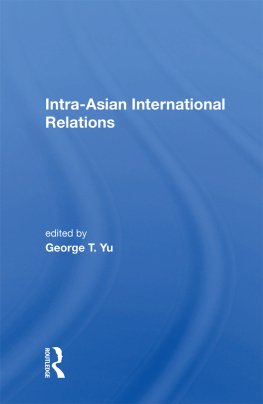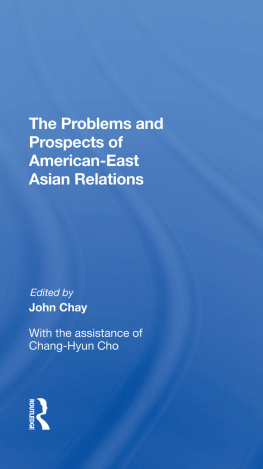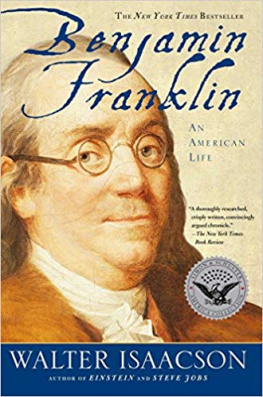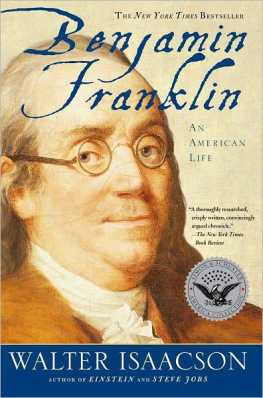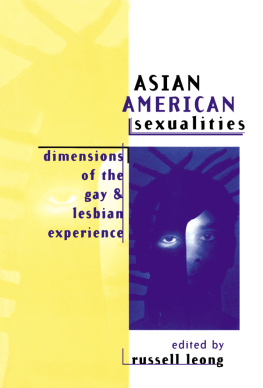Asians in America
The Peoples of East, Southeast, and South Asia in American Life and Culture
Series Editor
Franklin Ng
California State University Fresno
A GARLAND SERIES
Contents of the Series
The History and Immigration of Asian Americans
Asian American Family Life and Community
Asian American Women and Gender
Adaptation, Acculturation, and Transnational Ties Among Asian Americans
Asian American Interethnic Relations and Politics
Asian American Issues Relating to Labor, Economics, and Socioeconomic Status
First published by Garland Publishing, Inc
This edition published 2013 by Routledge
711 Third Avenue, New York, NY 10017
2 Park Square, Milton Park, Abingdon, Oxfordshire OX14 4RN
Routledge is an imprint of the Taylor & Francis Group, an informa business
Introductions copyright 1998 Franklin Ng. All rights reserved.
Library of Congress Cataloging-in-Publication Data
Asian American interethnic relations and politics I edited with introductions by Franklin Ng.
p. cm. (Asians in America ; 5)
Includes bibliographical references.
ISBN 0-8153-2694-7 (v. 5 : alk. paper). ISBN 0-8153-2689-0 (6 vol. set : alk. paper)
l. Asian AmericansPolitics and government. 2. United StatesEthnic relations. I. Ng, Franklin, 1947 . II. Series.
E184.06A8414 1998
| 305.895073dc21 | 98-14136
CIP |
| SET ISBN | 9780815326892 | ASIANS IN AMERICAN LIFE (SET) |
| POD ISBN | 9780415895460 |
| Vol1 | 9780815326908 | HIST & IMMIGRATION ASIAN |
| Vol2 | 9780815326915 | ASIAN AMER FAMILY LIFE V2 |
| Vol3 | 9780815326922 | ASIAN AMER WOMEN & GENDER |
| Vol4 | 9780815326939 | ADAPTATION ACCULTURA V4 |
| Vol5 | 9780815326946 | ASIAN AMER INTERETHNIC V5 |
| Vol6 | 9780815326953 | ASIAN AMER ISSUE LABOR V6 |
Contents
Shirley Hune
Don T. Nakanishi
Bob H. Suzuki
Won Moo Hurh and Kwang Chung Kim
Stephen S. Fugita and David J. OBrien
Michael C. Thornton and Robert J. Taylor
Harvard Law Review
Leland T. Saito
John C. Harles
Masako lino
Madge Bello and Vincent Reyes
Don T. Nakanishi
David Lopez and Yen Espiritu
As the fastest growing segment of the U.S. population since the mid-1960s, Asian Americans encompass Chinese, Japanese, Koreans, Filipinos, Asian Indians, Pakistanis, Sri Lankans, Bangladeshis, Vietnamese, Lao, Hmong, Cambodians, Iu-Mien, and others. Their remarkably diverse ethnic, social, historical, and religious backgrounds and experiences enrich the cultural fabric of the United States. The study of Asian Americans offers many insights on such issues as immigration, refugee policy, transnationalism, return migration, cultural citizenship, ethnic communities, community building, identity and group formation, panethnicity, race relations, gender and class, entrepreneurship, employment, representation, politics, adaptation, and acculturation.
This collection of articles presents contemporary research that examines such issues as the growing political power of Asian Americans, the empowerment of emigrant women, the rise of youth gangs, relations between ethnic groups, the migration of highly educated Asians, and other important subjects. The writings are drawn from a wide variety of disciplines to provide a broad but informative array of insights on this fascinating and diverse population. The volumes give in-depth exposure to important issues linked to the different communities and impart a greater understanding of the Asian Americans in the United States.
This series consists of six volumes, and its coverage cuts across many disciplines. The first volume focuses on the history and immigration of Asian Americans. The second volume treats various themes relating to Asian American family life and community. The third volume is complementary and considers vital issues pertaining to Asian American women and gender. A fourth volume explores the processes of adaptation and acculturation, as well as the continuing significance of transnational ties for Asian Americans. The fifth volume addresses the complex subject of interethnic relations and Asian American politics. Finally, the last volume examines issues associated with labor, employment, entrepeneurship, enclave economies, and socioeconomic status.
In preparing this anthology, I have had help from many individuals. I would especially like to acknowledge assistance from Leo Balk, Paul Finkelman, and Carole Puccino. Their patience, encouragement, and guidance helped to ensure the success of this project.
Racial and ethnic relations in the United States are often seen through a bifocal lens of black and white relations. In recent years, this has been broadened somewhat to include Hispanic relations. On occasion, Native Americans are also incorporated into these discussions. Frequently absent in dialogues about racial and ethnic relations of the United States are the Asian Americans. Partly because of their immigrant experience and the diversity of groups within that category, treatment of Asian Americans defies any simple treatment. For within the label of Asian Americans are groups as varied as the Chinese, Japanese, Koreans, Filipinos, Asian Indians, Vietnamese, Lao, Cambodians, Hmong, and others. As a result, the media and the press may find it convenient to avoid coverage of a population whose composition and dynamics seem too complex to understand.
But as a rapidly growing population in the United States, the presence of Asian Americans is increasingly difficult to ignore. Whereas in the past Asian Americans were heavily concentrated in Hawaii and the West Coast, they are now demographically scattered across the United States. They may be found in the Midwest, the East, and the South. Cities such as New York, Boston, Chicago, and Houston all have sizable Asian American communities. Moreover, the Asian American communities are just as likely to be in the inner cities as in the suburbs. As they mix into communities with other racial and ethnic groups, they must face issues pertaining to interracial relations.
Among the general public and the media, Asian Americans are regarded as a model minority with no social problems. Some Asian Americans themselves also subscribe to this view and welcome the accolades that such an image can bring. Bob H. Suzuki looks at the educational attainment and incomes of Asian Americans and provides a critique of the model minority thesis. Won Moo Hurh and Kwang Chung Kim explore the implications of the successful image of Asian Americans and how it distorts understanding of Asian American community problems. Shirley Hune provides another look at the issue by examining the development of Asian American studies as a discipline. Because of its close involvement historically with community activism, Asian American studies continues to be concerned with the study and research of contemporary social issues that affect Asian Americans.
The interethnic relations that Asian Americans have had with other groups have not been uniformly harmonious. Stephen S. Fugita and David J. OBrien explore the different dimensions of ethnicity in group conflict between Japanese American farmers and Mexican members of the United Farm Workers Union. Recent newspaper headlines have drawn attention to conflicts between Korean Americans and African Americans in a number of different cities. Michael C. Thornton and Robert J. Taylor investigate black perceptions and attitudes toward Asian Americans. Even different Asian American groups may experience friction and conflict. Leland T. Saito notes that Japanese Americans who have been longtime residents of Monterey Park, California, do not necessarily welcome the arrival of Chinese immigrants into their community. The newcomers are seen as changing the comfortable character of their settled neighborhoods. The incidence of racial violence against Asian Americans is a topic that has escaped widespread attention. The magnitude of the problem and its causes are the subject of a study by the


